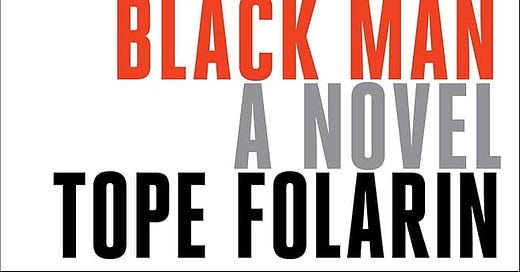Published in: 2019
Plot: In A Particular Kind of Black Man, Tunde Akinola grows up in small-town Utah, feeling disconnected from both his Nigeria-born parents and the predominantly white community that surrounds him. Though he speaks with a Midwestern accent, Tunde can't escape the racism and isolation he faces as children question the color of his skin. His father remains optimistic, tirelessly pursuing the American dream, while his mother, overwhelmed by loneliness and schizophrenia, eventually flees with Tunde and his younger brother. After she returns to Nigeria, Tunde struggles to find his place in a world that feels foreign wherever he goes—whether it's among his new stepfamily, in a Texas middle school, or at a historically black college. His search for connection leads him on a journey of self-discovery, where memory, manhood, home, and identity take on new meaning through the lens of a first-generation Nigerian-American
Trivia: In 2013 Folarin became the first writer based outside Africa to win the Caine Prize, which he won for his short story "Miracle."
Before we started, there were 2 readers talking about this book. They shared the sentiment that when they picked up the book, they didn’t know if they would love it. And to be honest, they didn’t love it. But they said they were looking forward to discussing it with the group because they tend to gain more of an appreciation of the novel. So they were excited to hear what everyone thought of A Particular Kind of Black Man.
The discussion leader kicked things off with a discussion of a scene where Tunde, the protagonist, was in school. He said the word “parloh” when talking about his living room because that’s the way his father said it. When his teacher heard it, she corrected and embarrassed him. The leader deeply related to this, as he said he had similar experiences growing up. “Often times, I felt like a bother…my teacher had to correct me when I said things incorrectly.” Another reader chimed in and said he felt similar when he moved to the United States from Mexico. He said his “Spanglish” made him feel like he was burdening the teacher.”
One scene we talked about was the scene where Tunde’s father was serving ice cream at the county fair. It was painted so vividly and was such a happy scene. Tunde let his dad enjoy his busy day and was happy to be a part of it. He felt on top of the world. And it was great to read live in this happy scene in the middle of a book where there weren’t a lot of happy scenes.
As a side note, one reader pointed out that Ursula K. Le Guin’s name is mentioned in this novel. This is noteworthy because she was also mentioned (by all but her name) in the last novel we read, My Abandonment. Pretty cool that two of our authors mentioned her in their works. I guess we’ll see if anyone else does (although, I’m guessing Wallace Stegner doesn’t mention her in Crossing to Safety).
The group talked about the role of the past and reflecting on it. Tunde has a quote about how nostalgia is currency and people that lug their past around have a hard time moving forward and progressing. One reader said, “Oh, that’s so true. Every time I get a new cellmate, I have to listen to their entire past for two straight days. It gets old pretty quickly!” That being said, this novel evoked a lot of nostalgic memories in each of the readers. The scene where the father is riding around in his ice cream truck and the kids are on a mattress in the back brought back a lot of memories for our group. Everything from riding around with their dad in the summer, to their relationship to their dad. One reader was quick to point out that it’s fun to reminisce, but the dad in the book said that we have eyes on the front of our head, not the back. So it is important to look and move forward.
We all admitted we forgot this book was a work of fiction. It’s written so vividly like a memoir. One reader said he forgot the author’s name wasn’t Tunde until he finished the book. We all wondered how much of the novel was true. And we all admitted that we were completely swept up in the world of the novel.
Thanks for reading. Next week, we’ll be talking about Picnic in the Ruins by Todd Robert Petersen. We hope you’ll join us. And we hope you’re reading something good!
Until then,
E.
If you would like to read A Particular Kind of Black Man here are some links:




